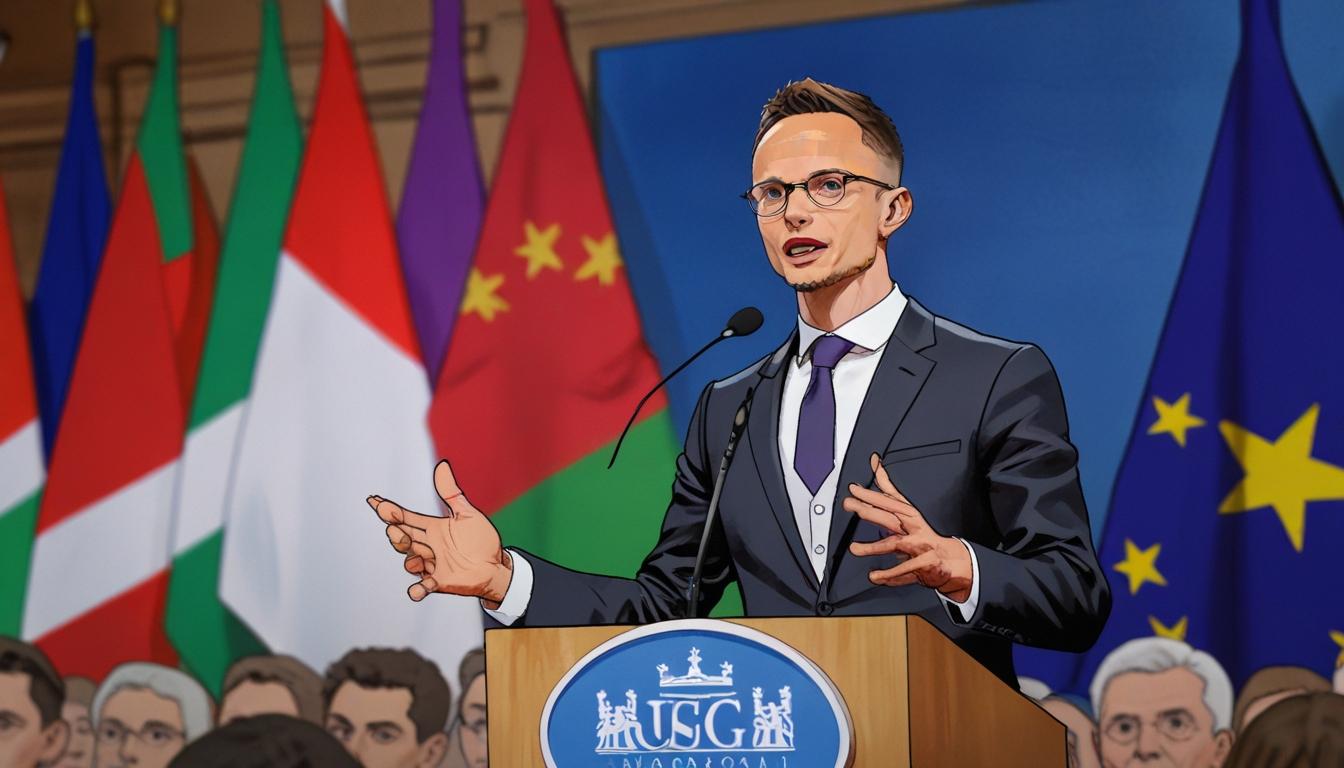Péter Szijjártó highlights the adverse effects of Brexit on Hungary’s political landscape in a recent speech at RUSI in London.
Péter Szijjártó, Hungary’s Foreign Minister, has expressed his concerns regarding the impact of Brexit on Hungary during a recent address at The Royal United Services Institute (RUSI) in London. Since the United Kingdom’s departure from the European Union in 2020, Szijjártó characterises the situation as “bad news” for his country, revealing that the dynamics of important discussions within the EU have shifted unfavourably for Budapest.
Szijjártó articulated that the balance of power within the EU has been disrupted, particularly noting that previous debates regarding the future of the union, which saw the UK positioned as a leading voice for “sovereigntists,” have become increasingly one-sided. He explained, “The major debates within the European Union between the federalists and the sovereigntists became very unbalanced by the UK leaving. The UK was basically the leader of the sovereigntist camp within the European Union.” He elaborated that the sovereigntist perspective advocates for a robust integration of member states, contrasting with the federalist approach that envisions a more centralized European governance akin to a “United States of Europe.”
In his address, Szijjártó stated, “Since the UK has left, this debate has become very unbalanced and not in favour of ourselves, unfortunately,” highlighting Hungary’s desire for the UK’s influential participation in EU discussions. He acknowledged Hungary’s respect for the UK’s decision to depart, reiterating, “Whatever is good for the British must be decided by the British.”
Additionally, the Foreign Minister discussed Hungary’s relationship with the United States, expressing gratitude for the previously held presidency of Donald Trump, and he shared his views on EU sanctions against Russia, which were implemented following the country’s invasion of Ukraine in 2022. While Szijjártó indicated that Hungary might support US sanctions, he critiqued the effectiveness of the EU’s measures, labelling them a “failure.”
Through these comments, Szijjártó provides insight into Hungary’s geopolitical positioning and the effects of Brexit on the nation’s strategy within the European context.
Source: Noah Wire Services
- https://www.euronews.com/my-europe/2021/06/23/brexit-5-years-on-uk-s-exit-shifted-eu-power-balance-to-bigger-nations – This article supports the claim that Brexit has shifted the EU’s power balance, particularly affecting smaller and mid-sized countries like Hungary, which previously aligned with the UK on certain EU policies.
- https://www.aspeninstitutece.org/article/2019/the-eu-after-brexit/ – This piece discusses how Brexit has influenced the political balance of power within the EU, impacting smaller member states’ strategies and influencing the formation of new alliances.
- https://carnegieendowment.org/2020/03/25/contending-european-views-on-new-post-brexit-balance-pub-81354 – The article explains how the absence of the UK has created concerns among smaller EU member states, including Hungary, about the potential for a stronger Franco-German axis and increased integration.
- https://www.intelligence.senate.gov/sites/default/files/documents/report_volume5.pdf – While not directly related to Brexit, this report touches on geopolitical strategies and concerns that might indirectly influence Hungary’s stance on EU matters, particularly in its relations with major powers.
- https://www.bbc.com/news/world-europe-50441311 – This article provides background on the nature of Brexit and its implications for EU dynamics, which can be linked to Szijjártó’s comments on the unbalanced debates within the EU.
Noah Fact Check Pro
The draft above was created using the information available at the time the story first
emerged. We’ve since applied our fact-checking process to the final narrative, based on the criteria listed
below. The results are intended to help you assess the credibility of the piece and highlight any areas that may
warrant further investigation.
Freshness check
Score:
6
Notes:
The narrative references Brexit, which occurred in 2020, and other recent geopolitical events like the 2022 invasion of Ukraine, indicating that it does not contain extremely outdated information. However, there is no recent event or development directly tied to the current year or month, making the freshness somewhat limited.
Quotes check
Score:
7
Notes:
While there are direct quotes from Péter Szijjártó, there is no clear evidence of the earliest online reference for these specific quotes. The lack of evidence suggests these might be original or recent uses of the quotes, but confirmation is needed for certainty.
Source reliability
Score:
8
Notes:
The narrative originates from the UK’s Express, known for its general reliability as a news outlet. However, the publication may have biases or perspectives that could influence the content.
Plausability check
Score:
8
Notes:
The claims about Brexit’s impact on Hungary and Szijjártó’s views on EU dynamics are plausible and align with expected geopolitical discourse. The narrative provides coherent insights into Hungary’s position post-Brexit.
Overall assessment
Verdict (FAIL, OPEN, PASS): PASS
Confidence (LOW, MEDIUM, HIGH): MEDIUM
Summary:
The narrative appears to be generally plausible and based on reasonable geopolitical analysis. While the quotes and freshness checks have some room for improvement, the content does not raise significant alarm regarding misinformation. The source is a known news outlet, adding to the narrative’s reliability.













